Navigating the Holidays with Dementia: A Guide for Families
Explore 'Navigating the Holidays with Dementia: A Guide for Families' for strategies to make festive seasons joyful and comfortable for loved ones with dementia. Learn effective communication, adapt traditions, and manage behaviors with empathy and understanding
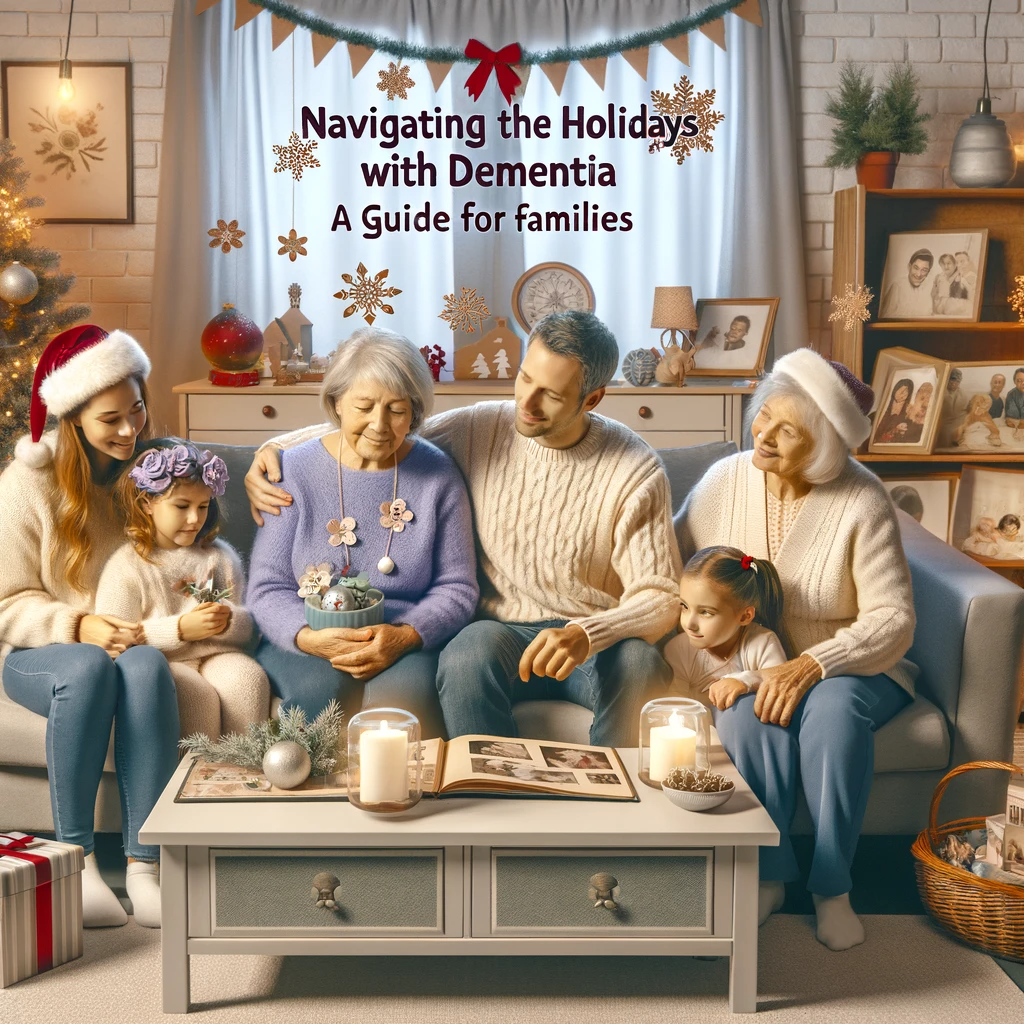
Embracing the Holiday Spirit with Dementia in Mind
As autumn leaves give way to winter’s chill, our homes fill with the scents and sights of the holiday season. It's a time for family, love, and cherished traditions. For those with dementia, including Alzheimer's disease, these festivities hold a special significance. They offer a moment to reconnect with distant memories, bringing joy and comfort.
Understanding the Challenges for Caregivers
Caring for a loved one with dementia during the holidays can be demanding. As the disease progresses, routine tasks become more complex, adding stress to the festive season. It's crucial for caregivers to manage their expectations and seek support when needed.
Creating New Memories and Maintaining Traditions
Engaging in familiar activities like baking cookies or crafting cards can be therapeutic for those in the early-to-middle stages of dementia. These moments of quality time can help slow the disease’s progression and provide immense emotional benefits.
Someone with Dementia Is Living in the Present

Living in the Present: A Dementia Perspective
Individuals with dementia often focus on the present, making it important for family members to adapt. In the later stages, short-term memory fades, shifting the focus to emotional connections rather than past recollections.
Effective Communication Strategies
As dementia advances, communication becomes key. It’s important to use simple language, a calm tone, and physical touch to convey reassurance and understanding. Being attuned to their emotions is essential as they are sensitive to the feelings of those around them.
Effective communication is a crucial aspect of caring for someone with dementia, especially during the holidays when family gatherings and changes in routine can be overwhelming.
Here are some strategies and examples to enhance communication:
Use Simple Language and Short Sentences: Speak clearly and directly, using simple words and short sentences. This makes it easier for the person with dementia to process and understand.
Example: Instead of saying, "Would you prefer to have your dinner now or would you like to wait until after we watch the evening news?", say, "It's time for dinner. Let's eat."
Avoid Open-Ended Questions: People with dementia may struggle with choices. Offer clear, binary options or suggest one thing at a time.
Example: Rather than asking, "What would you like to wear today?", say, "Would you like to wear your blue sweater or your red shirt?"
Be Patient and Give Them Time to Respond: Understand that it may take longer for them to process information and respond. Avoid rushing them or finishing their sentences.
Example: After asking a question, wait quietly for a response. If they seem to struggle, gently repeat or rephrase the question.
Use Non-Verbal Cues: Body language, facial expressions, and physical touch can be reassuring. A gentle touch on the arm or a warm smile can convey affection and understanding.
Example: Smile and make eye contact when speaking. Use a gentle touch to guide them to the dinner table or to sit down.
Maintain a Calm and Positive Tone: Your tone of voice can convey more than your words. Use a calm, gentle, and positive tone to convey your message reassuringly.
Example: When they become agitated, use a calm tone to soothe them, saying something like, "It's okay, I'm here with you."
Avoid Correcting or Arguing: Trying to correct or argue with a person with dementia can lead to frustration and anxiety. Instead, try to enter their reality and validate their feelings.
Example: If they insist it’s morning when it’s actually evening, instead of correcting them, respond with, "It looks like a beautiful day, doesn’t it?"
Redirect and Distract When Needed: If they become upset or fixated on a particular topic, gently redirect the conversation or activity to something more soothing or engaging.
Example: If they get agitated about wanting to go home, redirect by saying, "Let's have some tea first and then talk about it."
Use Reminiscing and Familiar Topics: Discussing familiar subjects such as past hobbies or fond memories can be comforting and easier for them to engage with.
Example: "Do you remember the holiday cookies we used to bake together? They were so delicious."
Utilize Visual Aids: Pictures or objects can sometimes help to communicate more effectively than words alone.
Example: Show them a picture of family members when talking about them, or hold up two outfits when helping them choose what to wear.
Reassure and Comfort: Regularly reassure them that they are safe and loved. This can help alleviate anxiety and confusion.
Example: "You’re safe here with me. I enjoy spending time with you."
By incorporating these strategies into your interactions, you can foster a more positive and meaningful connection, making the holiday season more enjoyable for both you and your loved one with dementia.
Making the Most of Holiday Visits

Making the most of holiday visits with a loved one who has dementia involves planning and adapting traditional activities to suit their current abilities and comfort level. Here are some strategies with examples to ensure these visits are enjoyable and meaningful:
- Plan for Shorter Visits: Long gatherings can be overwhelming. Schedule shorter, more frequent visits to keep your loved one from becoming too tired or overstimulated.
- Example: Instead of an all-day event, plan a two-hour visit in the morning or afternoon.
- Create a Quiet Space: Arrange a quiet room or area where your loved one can retreat if the noise or activity becomes too much.
- Example: Set up a comfortable room with their favorite chair, a soft blanket, and some soothing music or a familiar movie.
- Involve Them in Simple Activities: Choose activities that are easy to follow and not too demanding, allowing them to participate without stress.
- Example: Decorating cookies with pre-made dough, or helping to place ornaments on a lower branch of the Christmas tree.
- Maintain Routines as Much as Possible: Try to keep your loved one’s daily routine intact, as changes can be disorienting.
- Example: If they usually have lunch at noon, ensure that you stick to this schedule even during a visit.
- Prepare Visitors in Advance: Brief family members and friends on what to expect and how to communicate effectively with your loved one.
- Example: Advise them to speak slowly, clearly, and to not be offended if their loved one doesn’t recognize them.
- Use Familiar Holiday Music and Decorations: Familiar tunes and decorations can evoke pleasant memories and feelings.
- Example: Play holiday music that they loved in the past or use decorations that they have always enjoyed.
- Monitor for Signs of Fatigue or Overwhelm: Be vigilant for signs that your loved one is getting tired or anxious, and be ready to respond.
- Example: If they start to look sleepy or agitated, suggest a break or a change to a quieter activity.
- Incorporate Reminiscing: Encourage conversations about past holidays, which can be comforting and engaging for them.
- Example: “Remember how we used to go caroling? What was your favorite Christmas carol?”
- Adjust Expectations: Understand that holidays won’t be the same as they were before dementia. Focus on what your loved one can enjoy now.
- Example: Accept that they might not participate in every activity or remember every family member, and that’s okay.
- Ensure Physical Comfort: Make sure they are dressed comfortably and the environment is not too hot, cold, or brightly lit.
- Example: If they tend to get cold, have a warm sweater or blanket handy.
- Bring Familiar Objects: Sometimes, having a familiar object can be soothing for a person with dementia.
- Example: Bring a favorite pillow, photo album, or a treasured memento to the gathering.
By implementing these strategies, holiday visits can be tailored to the unique needs of a person with dementia, making the season enjoyable and stress-free for everyone involved.
When spending time with someone with dementia, focus on simple, present-moment activities. Encourage participation in outdoor activities like walks or drives to see holiday lights, ensuring safety and comfort at all times.
When you're spending time with a loved one who is living with an dementia diagnosis. It's best to focus on the present rather than attempt to remember events from past. Make communication easier and use simple one or two word sentences. Avoid giving multiple choices. Instead, offer one thing. If they decline, offer another choice. Keeping it simple makes life easier.
Invite them to join in simply observing nature and its wonders. If they are still able to walk, or go for a ride, getting outside for some fresh air and sunshine. It improves their well being and can lift their mood.
There is nothing like a ride to see the holiday lights to lift spirits. Make sure you allow short breaks on outings and make sure that home safety is addressed to prevent falls. Holiday decorations may upset the person with dementia as their familiar environment is different to them. Oh, make sure they have any assistive devices as a safety feature when you are out and about. Make sure you give your loved one a short break if they need one.

While enjoying these 'here and now' moments, this could trigger happy memories that your loved one may choose to share. This is only possible in the early stages of dementia. As the disease progresses, communication skills will deteriorate over time.
Educating and Preparing Family Members
Educate visiting family members about the changes in communication and behavior due to dementia. Patience and understanding from everyone can make visits more enjoyable.
Educating and preparing family members for interacting with a loved one with dementia during the holidays is essential for creating a supportive and understanding environment.
Here are strategies to help family members understand and adapt, along with examples:
Provide Information About Dementia: Educate family members on what dementia is and how it affects behavior and communication. This understanding is key to managing expectations.
Example: Share articles, videos, or resources from reputable sources like the Alzheimer's Association that explain the symptoms and progression of dementia.
Discuss Specific Changes in Your Loved One: Inform family members about the specific ways dementia has affected your loved one, including any changes since they last met.
Example: "Grandma may not remember recent events, but she enjoys talking about her childhood."
Offer Communication Tips: Teach family members effective communication strategies for interacting with someone with dementia.
Example: Advise them to use simple, direct sentences and to avoid correcting or arguing if your loved one becomes confused about people or events.
Set Realistic Expectations for the Visit: Let family members know what to realistically expect during their visit.
Example: "Uncle Joe may not remember your name, but he enjoys company and listening to familiar stories."
Provide Guidance on How to Engage: Suggest activities that your loved one can participate in and enjoy.
Example: "Dad loves listening to old music, so you could play some of his favorite songs from the 60s."
Explain How to Handle Confusion or Agitation: Give tips on what to do if your loved one becomes upset or agitated.
Example: "If Mom gets confused, it's best to change the subject or move to a different activity rather than trying to reason with her."
Discuss the Importance of Routine: Stress the importance of maintaining routine for someone with dementia.
Example: "It's important we have dinner at her usual time to keep her comfortable and prevent agitation."
Prepare Them for Emotional Responses: Let family members know that emotional outbursts or unusual behavior are part of the condition and not personal.
Example: "If Grandpa gets angry or starts crying, it's just a part of his condition. It’s not directed at you."
Advise on Physical Interaction: Guide them on appropriate physical interactions, like gentle touches, that can be comforting.
Example: "A gentle pat on the back or holding her hand can be reassuring for Grandma."
Remind Them to Be Patient and Compassionate: Emphasize the need for patience and compassion during interactions.
Example: "Please be patient if it takes her longer to respond, and try to keep the conversation light and positive."
Plan for Group Dynamics: Discuss how to manage group interactions to ensure they are not overwhelming.
Example: "Let's avoid having everyone crowd around him at once, as it can be confusing."
By educating and preparing family members with these strategies, you can help create a holiday environment that is both enjoyable and comfortable for your loved one with dementia, as well as for the rest of the family.
Making Meaningful Connections With Communication Skills
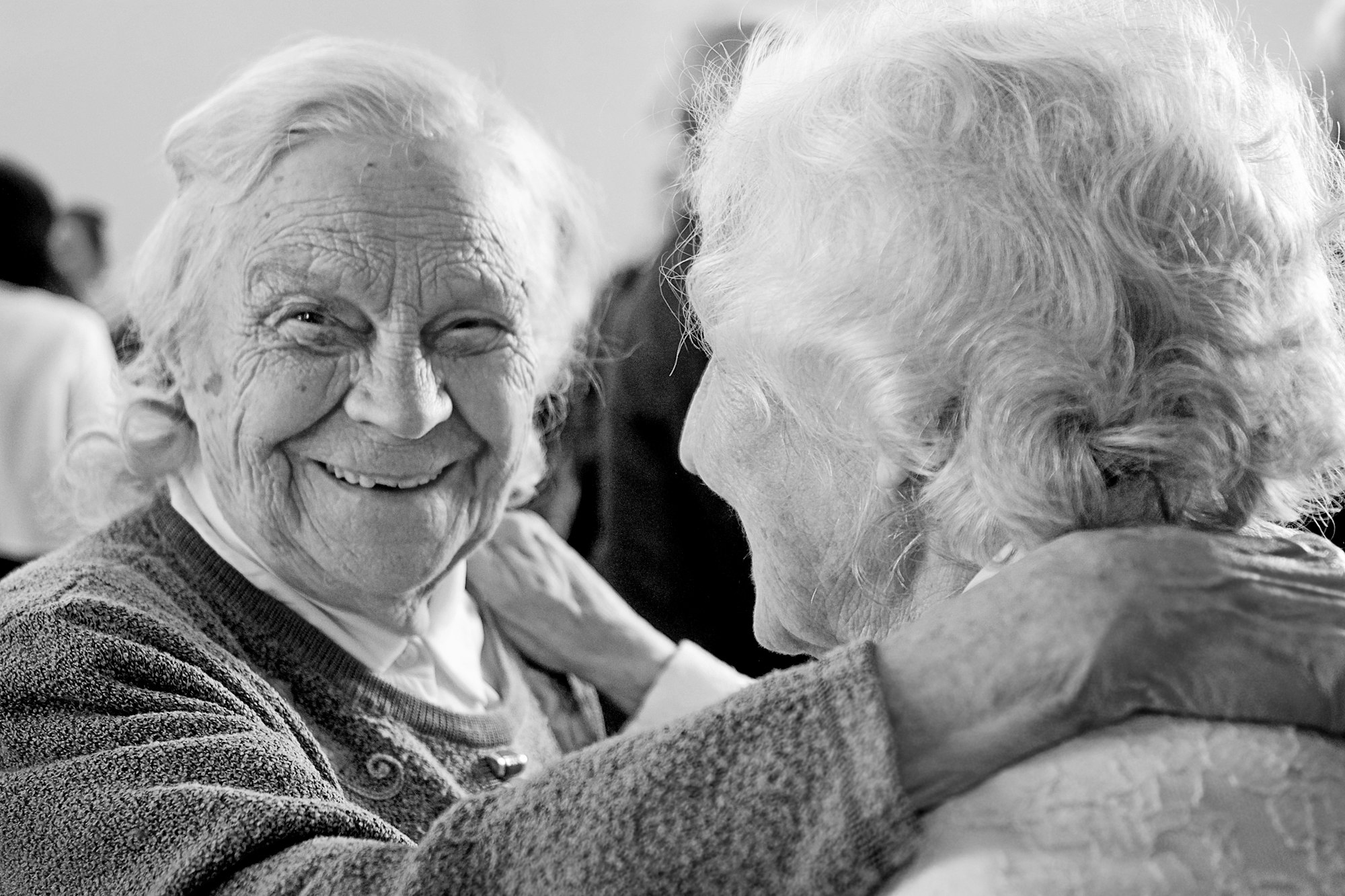
Adapting to New Communication Methods
As dementia progresses, non-verbal communication becomes increasingly important. Pay attention to body language and signs of discomfort or pain, adjusting care accordingly.
Adapting to new communication methods is essential when interacting with a person with dementia, as their ability to process and respond to conventional communication diminishes over time. Here are some strategies to effectively adapt communication methods, along with examples:
Use Non-Verbal Communication: As verbal abilities decline, non-verbal cues become increasingly important. Pay attention to facial expressions, gestures, and body language.
Example: Use a warm smile, gentle touch, or nodding to convey understanding and empathy.
Simplify Language: Use simple, clear, and direct language. Choose straightforward words and short, concise sentences.
Example: Instead of saying, "Would you like to get ready for our outing to the park this afternoon?", say, "Let's get ready to go outside."
Be Patient: Allow extra time for your loved one to process and respond. Don’t rush them or interrupt.
Example: After asking a question, wait patiently for a response, even if it takes longer than usual.
Repeat or Rephrase as Needed: If your loved one doesn’t understand something the first time, try repeating it or rephrasing it in simpler terms.
Example: If they don’t respond to, “Do you want some tea?”, try rephrasing to, “Would you like a drink?”
Utilize Visual Aids: Pictures, objects, or gestures can help convey your message.
Example: Show a picture of a bed when suggesting it's time to sleep, or mime drinking when offering a beverage.
Reduce Environmental Distractions: Minimize background noise and distractions to make it easier for them to focus on your communication.
Example: Turn off the TV or radio during conversations to reduce confusion.
Focus on Familiar Topics: Talk about familiar subjects that are easier for them to understand and engage with.
Example: Discuss a favorite old movie or talk about familiar family members.
Use Touch and Physical Cues: Gentle, reassuring physical contact can be effective, especially when verbal communication is limited.
Example: Hold their hand or gently touch their arm to provide comfort and connection.
Match Your Emotions to Your Words: Ensure your facial expression and tone match the message you’re conveying.
Example: Use a happy tone and smile when sharing good news.
Validate Their Feelings: Acknowledge and validate their emotions, regardless of the content of their speech.
Example: If they express worry about a misplaced item, say, “I see you’re worried. Let’s look for it together.”
Use Redirecting Techniques: If they become fixated on a topic or upset, gently redirect the conversation to something more positive or soothing.
Example: If they get agitated talking about a specific event, shift the conversation to talking about their favorite food or a pleasant memory.
Incorporate Humor When Appropriate: Light humor can be a powerful tool for connecting and diffusing tension, as long as it is respectful and appropriate.
Example: Joke about how you can never remember where you left your keys either.
Adapting your communication methods in these ways can help maintain a meaningful connection with a person with dementia, ensuring that interactions remain positive and supportive.
Every moment brings us the potential for a meaningful connection - something we could uniquely share. Our other family member with dementia deserves to experience all that this holiday season has to offer. So let's come together and do what we can!
Recognizing and Responding to Dementia Behaviors
Understanding and responding compassionately to behavior changes, like episodes of anger or frustration, is key. These behaviors are often a result of confusion, fear, or physical discomfort.
Recognizing and responding appropriately to dementia-related behaviors is crucial in providing compassionate care. Individuals with dementia may exhibit various behaviors due to confusion, fear, or frustration associated with their declining cognitive abilities. Here are strategies to recognize and respond to these behaviors effectively:
- Agitation or Aggression: This can manifest as verbal or physical aggression, restlessness, or irritability.
- Recognition: Look for signs like clenched fists, pacing, or a raised voice.
- Response: Maintain a calm demeanor. Ensure personal safety first, then try to identify and address the underlying cause, such as pain, discomfort, or overstimulation. Distraction with a favorite activity or music can also be effective.
- Wandering: A common behavior where the person with dementia aimlessly walks or tries to leave a safe environment.
- Recognition: Notice if they start to pace or seem restless and express a desire to “go home” even when they are home.
- Response: Ensure their environment is safe and secure. Provide supervision and try to identify triggers, such as boredom or a need to use the restroom. Redirect their attention to engaging activities.
- Repetitive Speech or Actions: Repeating words, questions, or activities is a common behavior.
- Recognition: Notice if they ask the same question or repeat the same word or movement over and over.
- Response: Respond with patience each time. Try to identify if there’s an unmet need or anxiety driving the behavior. Redirecting to a different activity can also help.
- Confusion and Disorientation: They may not recognize familiar people, places, or objects.
- Recognition: They might express uncertainty, look puzzled, or fail to recognize their surroundings.
- Response: Reassure and orient them gently. Avoid arguing or trying to convince them of the reality they can’t grasp. Use familiar objects and photographs to gently guide them.
- Sleep Disturbances: Difficulty in maintaining regular sleep patterns, leading to restlessness at night.
- Recognition: Waking up frequently during the night or sleeping at odd hours.
- Response: Establish a regular nighttime routine and create a calm environment before bedtime. Limit naps and caffeine during the day.
- Changes in Appetite: They may eat too little or too much, or forget to eat.
- Recognition: Notice changes in eating habits or weight.
- Response: Create a regular schedule for meals. Offer nutritious, favorite foods and ensure a comfortable, distraction-free eating environment.
- Hallucinations and Delusions: They may see, hear, or believe things that aren’t there.
- Recognition: Listen for talk of seeing people or objects that aren’t present or beliefs that are clearly untrue.
- Response: Respond to the emotion, not the hallucination. Offer reassurance and comfort. Gently redirect their attention without directly confronting the delusion.
- Inappropriate Behaviors: This includes undressing in public or using vulgar language.
- Recognition: Observe for socially inappropriate actions or words.
- Response: Stay calm and don’t scold or embarrass them. Gently guide them to a more appropriate behavior or setting.
- Loss of Social Filters: Saying or doing things without considering social norms.
- Recognition: Speaking bluntly or acting in ways that seem out of character.
- Response: Understand that this behavior is a result of the disease. Gently steer the conversation or activity in a different direction.
- Hoarding or Collecting: Accumulating items or refusing to throw things away.
- Recognition: Notice if they start to gather and store seemingly random items.
- Response: Ensure safety and cleanliness, but avoid arguing about the behavior. Try to understand the need it fulfills and provide alternatives.
In all responses, it’s important to maintain empathy, patience, and respect. Avoid taking behaviors personally and remember that they are manifestations of the disease. Seeking support from dementia care professionals and support groups can also provide valuable strategies and emotional support.
As difficult as it may be, dementia care requires patience and flexibility. Maintaining a positive attitude even during times of frustration can help create an environment that is both welcoming to those visiting and respectful towards the person living with dementia. Keeping your loved ones personal activities and daily routine is important to decreasing the chances of unwelcome behaviors.
Warning Signs of Dementia Behaviors
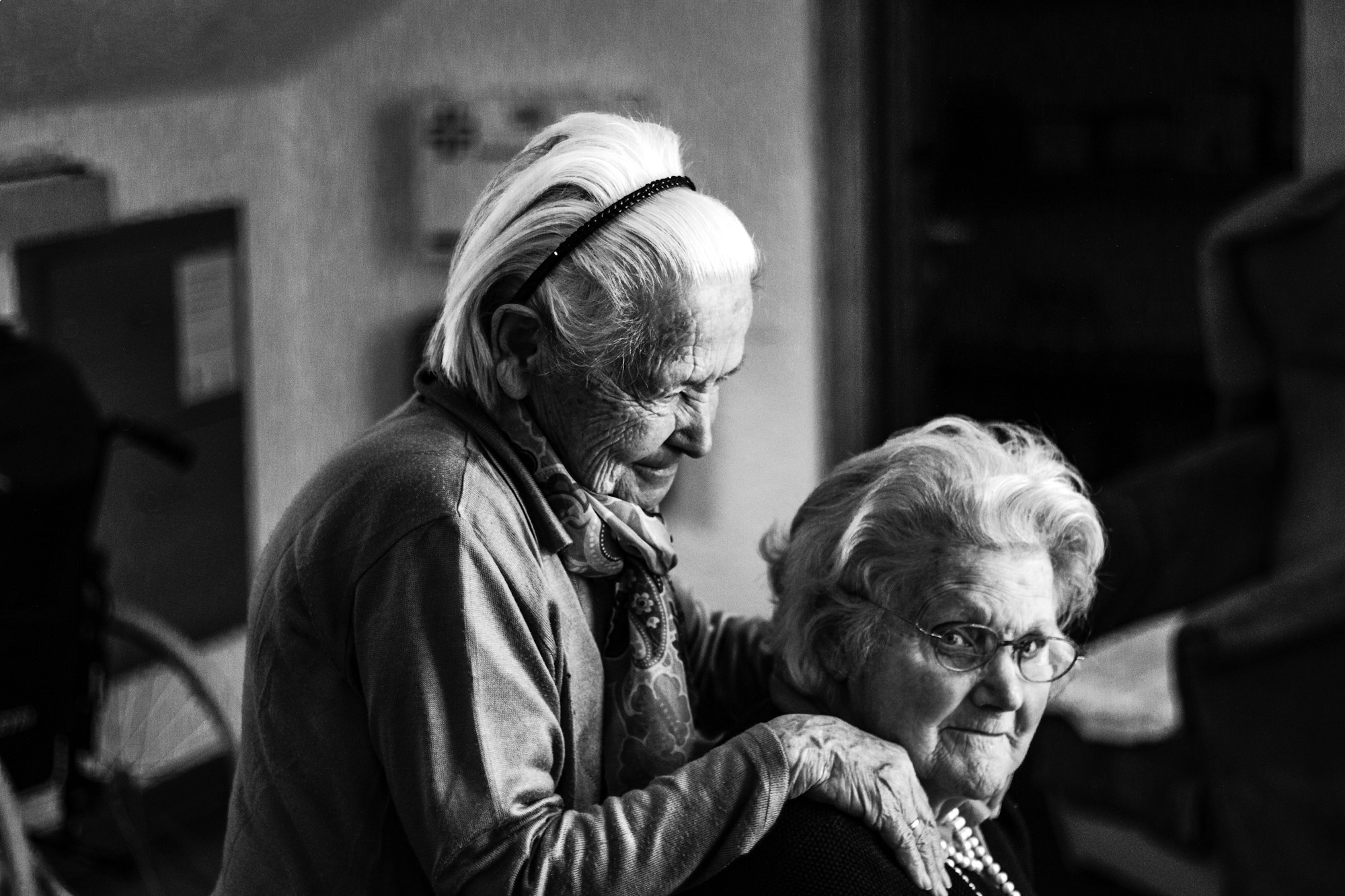
The truth of such troubling behavior should be understood as part of a larger picture - physical pain due to aging can often cause disruption and discomfort in those suffering from Alzheimer's disease. Explaining this reality ahead of time with visiting family members helps them understand how their patience will prove necessary for a successful visit.
Recognizing and responding appropriately to dementia-related behaviors is crucial in providing compassionate care. Individuals with dementia may exhibit various behaviors due to confusion, fear, or frustration associated with their declining cognitive abilities. Here are strategies to recognize and respond to these behaviors effectively:
Agitation or Aggression: This can manifest as verbal or physical aggression, restlessness, or irritability.
Recognition: Look for signs like clenched fists, pacing, or a raised voice.
Response: Maintain a calm demeanor. Ensure personal safety first, then try to identify and address the underlying cause, such as pain, discomfort, or overstimulation. Distraction with a favorite activity or music can also be effective.
Wandering: A common behavior where the person with dementia aimlessly walks or tries to leave a safe environment.
Recognition: Notice if they start to pace or seem restless and express a desire to “go home” even when they are home.
Response: Ensure their environment is safe and secure. Provide supervision and try to identify triggers, such as boredom or a need to use the restroom. Redirect their attention to engaging activities.
Repetitive Speech or Actions: Repeating words, questions, or activities is a common behavior.
Recognition: Notice if they ask the same question or repeat the same word or movement over and over.
Response: Respond with patience each time. Try to identify if there’s an unmet need or anxiety driving the behavior. Redirecting to a different activity can also help.
Confusion and Disorientation: They may not recognize familiar people, places, or objects.
Recognition: They might express uncertainty, look puzzled, or fail to recognize their surroundings.
Response: Reassure and orient them gently. Avoid arguing or trying to convince them of the reality they can’t grasp. Use familiar objects and photographs to gently guide them.
Sleep Disturbances: Difficulty in maintaining regular sleep patterns, leading to restlessness at night.
Recognition: Waking up frequently during the night or sleeping at odd hours.
Response: Establish a regular nighttime routine and create a calm environment before bedtime. Limit naps and caffeine during the day.
Changes in Appetite: They may eat too little or too much, or forget to eat.
Recognition: Notice changes in eating habits or weight.
Response: Create a regular schedule for meals. Offer nutritious, favorite foods and ensure a comfortable, distraction-free eating environment.
Hallucinations and Delusions: They may see, hear, or believe things that aren’t there.
Recognition: Listen for talk of seeing people or objects that aren’t present or beliefs that are clearly untrue.
Response: Respond to the emotion, not the hallucination. Offer reassurance and comfort. Gently redirect their attention without directly confronting the delusion.
Inappropriate Behaviors: This includes undressing in public or using vulgar language.
Recognition: Observe for socially inappropriate actions or words.
Response: Stay calm and don’t scold or embarrass them. Gently guide them to a more appropriate behavior or setting.
Loss of Social Filters: Saying or doing things without considering social norms.
Recognition: Speaking bluntly or acting in ways that seem out of character.
Response: Understand that this behavior is a result of the disease. Gently steer the conversation or activity in a different direction.
Hoarding or Collecting: Accumulating items or refusing to throw things away.
Recognition: Notice if they start to gather and store seemingly random items.
Response: Ensure safety and cleanliness, but avoid arguing about the behavior. Try to understand the need it fulfills and provide alternatives.
In all responses, it’s important to maintain empathy, patience, and respect. Avoid taking behaviors personally and remember that they are manifestations of the disease. Seeking support from dementia care professionals and support groups can also provide valuable strategies and emotional support.
Navigating the emotions of a loved one with dementia can be challenging, it’s just part of their journey. Caregivers should focus on creating positive memories ,when they do arise.
Celebrating in a Dementia-Friendly Way
The holidays with a loved one with dementia are about adapting traditions and focusing on the moment. It’s about creating a safe, enjoyable environment that acknowledges their current abilities and preferences.
The holiday season with a loved one with dementia is a time for patience, adaptability, and compassion. By focusing on their present needs and finding joy in simple moments, families can create a holiday experience that is meaningful and inclusive for everyone.
The Benefits of Touch

Touch is an invaluable way of expressing emotion and strengthening relationships. Hugs to welcome people home, hands on shoulders for deep talks - it all conveys love in the most meaningful manner.
For caregivers providing dementia care, particular care should be taken when initiating communication as this can prevent startling them or causing fear. A gentle touch before speaking may do wonders to settle them into conversation . As dementia progresses, much of your connection will come from non-verbal gestures so take full advantage now!
As dementia progresses, it is important, and can be very comforting, for the person with dementia receive physical affection from those they care about. A gentle tap on the shoulder or holding hands before speaking helps signal that something good is coming their way.
Even if verbal communication becomes difficult later down the line, tenderness through human contact remains ever-present – reminding us all of its power throughout every stage of this caregiving journey!
Open communication will help create meaningful experiences during visits with one another - especially those living with dementia.
So no matter what mental challenges arise, you can always share some quality time together as loved ones
Even though the challenges of communicating with a loved one who is living with dementia can be difficult, remember that their love and support are still there.
Despite the unpredictable nature of this condition, we believe everyone deserves happiness - especially during times spent as a family over the holidays. Cherish every moment together and take comfort in knowing that their love has helped shape who you've become today.
Adjusting to new ways of communication can take some time.
Have Realistic Expectations

Though the effects of a dementia diagnosis may vary from person to person, we hope this holiday season will be filled with moments for families to come together and enjoy each other's company, no matter how different it looks compared before.
This holiday season, it's not about the picture-perfect traditions you may think of when hearing "enjoying the holidays". Instead, focus on how your loved ones are feeling and make sure to forgive for any mistakes that were made.
When supporting a family member with dementia during these times, here are some useful tips: Be forgiving (to both you AND your loved one with dementia), keep conversations lighthearted & engaging throughout celebrations, providing comfort over being wholly focused on entertainment or activities. Adjust expectations as needed depending on their state of mind/mood changes day to day; provide loving reassurance before making any decisions which involve change from normal routines.
When preparing a loved one with dementia for family gatherings, in the early stages you still have an opportunity to discuss ways to enjoy the holidays that are comfortable and familiar. However, as their condition progresses it is up to you, the caregiver, to create situations where confusion or aggression can be prevented. This is accomplished by pre planing activities and preparing guests beforehand. You know your loved one's needs best; do what feels right!
Tips to Help Your Loved One With Dementia Enjoy the Holidays
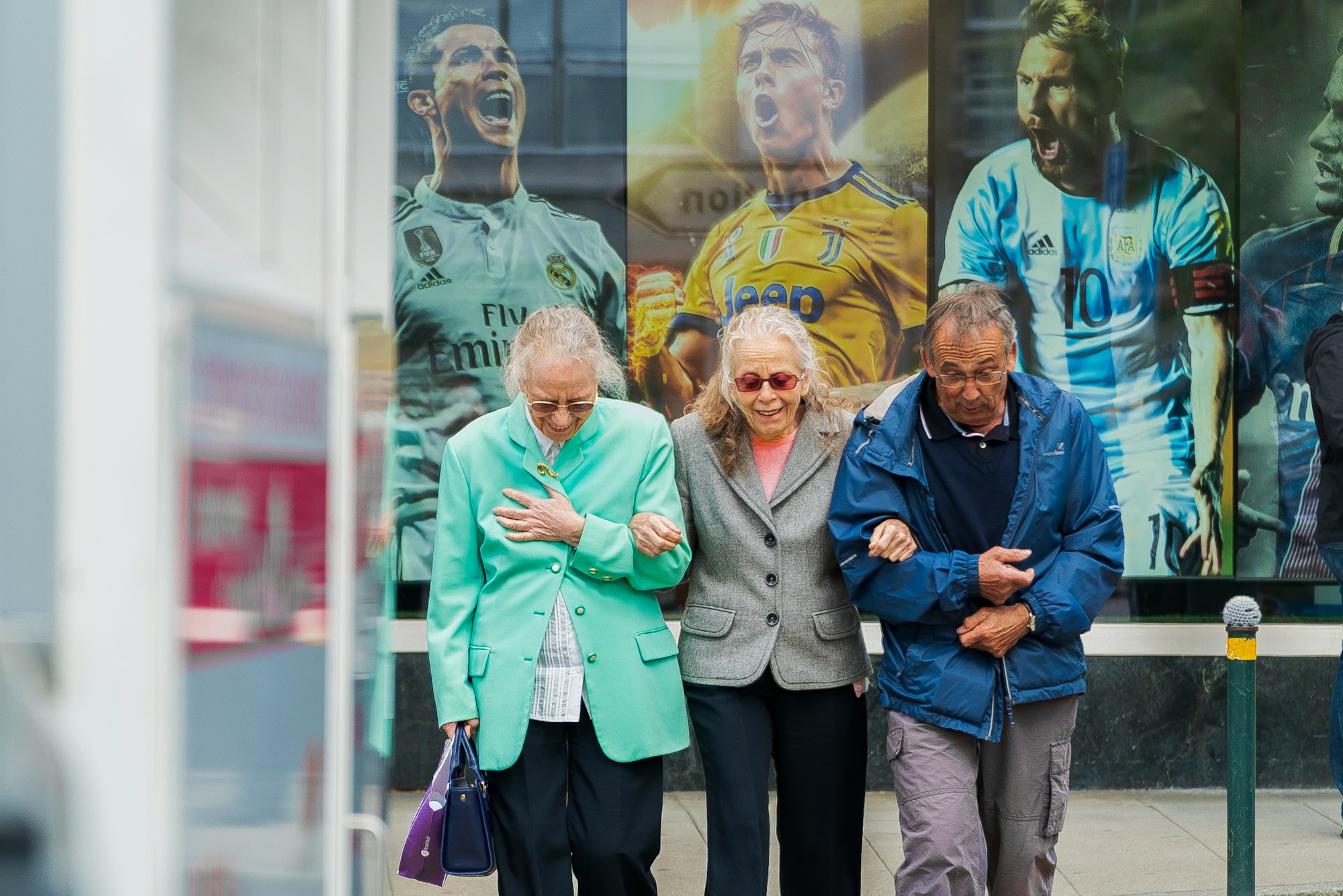
This holiday season, it's not about the picture-perfect traditions you may think of when hearing "enjoying the holidays". Instead, focus on how your loved ones are feeling. Allow yourself to forgive mistakes, embrace patience over perfectionism, and cherish meaningful moments together.
When supporting a family member with dementia during these times, here are some useful tips:
Keep conversations lighthearted & engaging throughout celebrations.
Providing comfort over being wholly focused on entertainment or activities. Focus on safety concerns, by adding safety features if necessary with the holiday decorations.
Adjust expectations, as needed, depending on their state of mind/mood changes day to day.
Provide loving reassurance before making any decisions, which involve change from normal routines.
Allow yourself the grace to enjoy the holidays with a loved one who has dementia. The season is about compassion, kindness and connection; remember that mistakes can be made but are insignificant when compared to these larger values.
Look for creative ways of connecting like enjoying movies together or starting an ongoing jigsaw puzzle so your loved one and you can continue building on it every time they visit!
Remember, your loved one with dementia is living in the here and now. They can no longer remember their past. Are unable to look to the future. They are living in the here and now. They often rely on visual cues when communicating.
Strive to include your loved one in activities, no matter their level of care needed.
Ask them to help you out on simple tasks that they can manage and encourage connection between the two of you through stories from days gone by.
As time progresses, a comforting gesture or kind words will let them know they're still very much part of your life.
Make sure to show your love and care for a loved one dealing with an illness by finding ways to make them feel involved in simple tasks, valuable conversations, or simply through comforting touch.
Playing Games

Inviting them into these activities can help build special moments of understanding and connection that you can cherish. Play games to improve brain health.
Offer emotional support through reassurance when words don’t come easily.
Spend part of each day prioritizing your self-care, tuning into what makes you feel loved and appreciated. This allows us to be kinder, more patient people that give our partners the appreciation they deserve; a gift we’d love in return!
Make this year truly special by focusing on what is important to you and your loved one. Every holiday will bring new challenges as the illness progresses, so it may be time to say goodbye to some activities that take away from shared moments together.
Why not turn everyday into a cherished moment with simple gestures .You don't need fancy decorations - create memories through meaningful interactions!
Make the most of your time by investing in moments that really matter this year. As loved ones struggle with their health, create memories and stay connected during special holidays instead of taking on additional commitments or tasks.
Start your day by reflecting on what is most valuable to you this year.
Free up some extra space in your schedule and choose meaningful experiences over additional commitments.
Modifying Traditions for Safety Concerns

This holiday season, don't forget to take into account the needs of those living with Alzheimers's disease and dementia. Although it may involve modifying some beloved traditions and toning down decorations in order to create a safe and calming space for them, there are still meaningful ways to celebrate!
Electric candles can be used as an alternative to burning candles, ensuring that everyone enjoys the festivities safely.
During the holidays, caregivers can make changes to create a safe and calm space for those with dementia. This could involve toning down decorations by replacing bright blinking lights with warm electric candles or avoiding decorative displays that cause clutter in familiar rooms.
The holidays are an emotional time for families and caregivers, especially when caring for a loved one with dementia. This year, try to create meaningful moments while considering their needs throughout decorations and gatherings.
To do so in the safest way possible. Avoid clutter-causing decor that requires you to rearrange familiar rooms too much.
Enjoy familiar holiday tunes to create a peaceful atmosphere. Set the volume of your favorite music according to what feels most relaxing for you!
Adapting Holiday Activities for Your Loved One with Dementia

Make the holidays special for a loved one living with dementia! Try to focus on activities that are familiar and meaningful, while keeping disruptions at bay.
Consider playing games that promote brain health. Research suggests that playing board games, word games, dice games and even video games can delay the progression of dementia.
Consider baking together, opening holiday cards or making decorations as tasks geared towards shared enjoyment. Baking cookies and decorations together is a great way to focus on enjoying the task instead of worrying about perfection
When hosting small gatherings of close friends & family, create an environment that is quiet yet inviting.
During longer outings such as visits with relatives be sure to keep trips brief so your friend/family member doesn't feel overwhelmed by changes in their routine.
Last but not least consider reading stories they love or looking through old photo albums, which can bring up fond memories from years past.
Provide them a place of their own if you're expecting guests, so they have a quiet calm area to retreat to when things get busy or to much activity for your loved one with dementia.
Keep outings brief so that fatigue doesn't set in!
Take the time to enjoy quality moments with your loved one this holiday season by engaging in enjoyable and dementia-friendly activities.
Older adults with dementia will find stringing a beautiful garland of popcorn or berries familiar objects form their childhood. Take time to link some delightful paper chains, make special wreaths and gifts together all while listening to festive music!
Baking cookies with a family member is also an excellent way spend time - don't forget that it's not just about making something delicious but being able share memories as you work on fun creations. You might want to consider offering finger foods or other easy to carry nutritious foods, such as fruit, to make sure your loved one with dementia does not become irritable.
Reading classic stories can add extra merriment into your day; what better way mark the holidays than celebrating faith and joy?
Make the holidays special for a person with dementia by working together to prepare, host safe and quiet gatherings, provide uninterrupted daily routines, give them space of their own if you are expecting company and engage in meaningful activities.
Prepare for the Unexpected

Be prepared for your next unexpected visit to the hospital. Taking a few precautions before emergencies occur can help make stressful situations less daunting and ensure that you're able to get timely treatment when needed. Create an up-to-date file with all relevant information including diagnosis of chronic medical conditions, test results, allergies, medications being taken currently etc., so you have it ready in case there's ever any need!
Keep this organized folder easily accessible at home or on cloud storage - It will be such a relief if something does come up unexpectedly! You want to make health care decisions in a timely fashion or have to set up in home care.
Preparing Your Holiday Visitors
Connecting with a loved one who has dementia during the holidays can be an enriching experience, but it's important to make sure they are prepared.
When coming together, to honor a loved one with dementia around the holiday season, it can be helpful to have an open discussion beforehand. Consider setting up a virtual group chat where you can discuss what is important for everyone visiting; such topics may include understanding the stage of their condition, how daily routines are integral in dementia care and ensuring patience during conversations without correcting or questioning them.
Setting clear expectations and boundaries before a family gathering can help ensure an enjoyable experience for everyone.
Ensure visitors have all of the necessary knowledge and supplies before their arrival.
Offer advice on how best to communicate - like not being critical of repeated or mistaken comments and allowing the person enough time speak before intervening – so everyone can get the most out of their shared moments together.
Encourage positive interaction through suggesting activities ahead of time like bringing along old photos or planning structured recreational events for everyone to enjoy!
Don’t forget about gift-giving. Making sure presents chosen hit safety standards but also provide appropriate stimulation based on their cognitive level is key! Maintaining realistic expectations of the gathering will help ensure that even if things don't go according to plan, there are still meaningful experiences shared between all those involved.
Celebrating in Nursing Homes
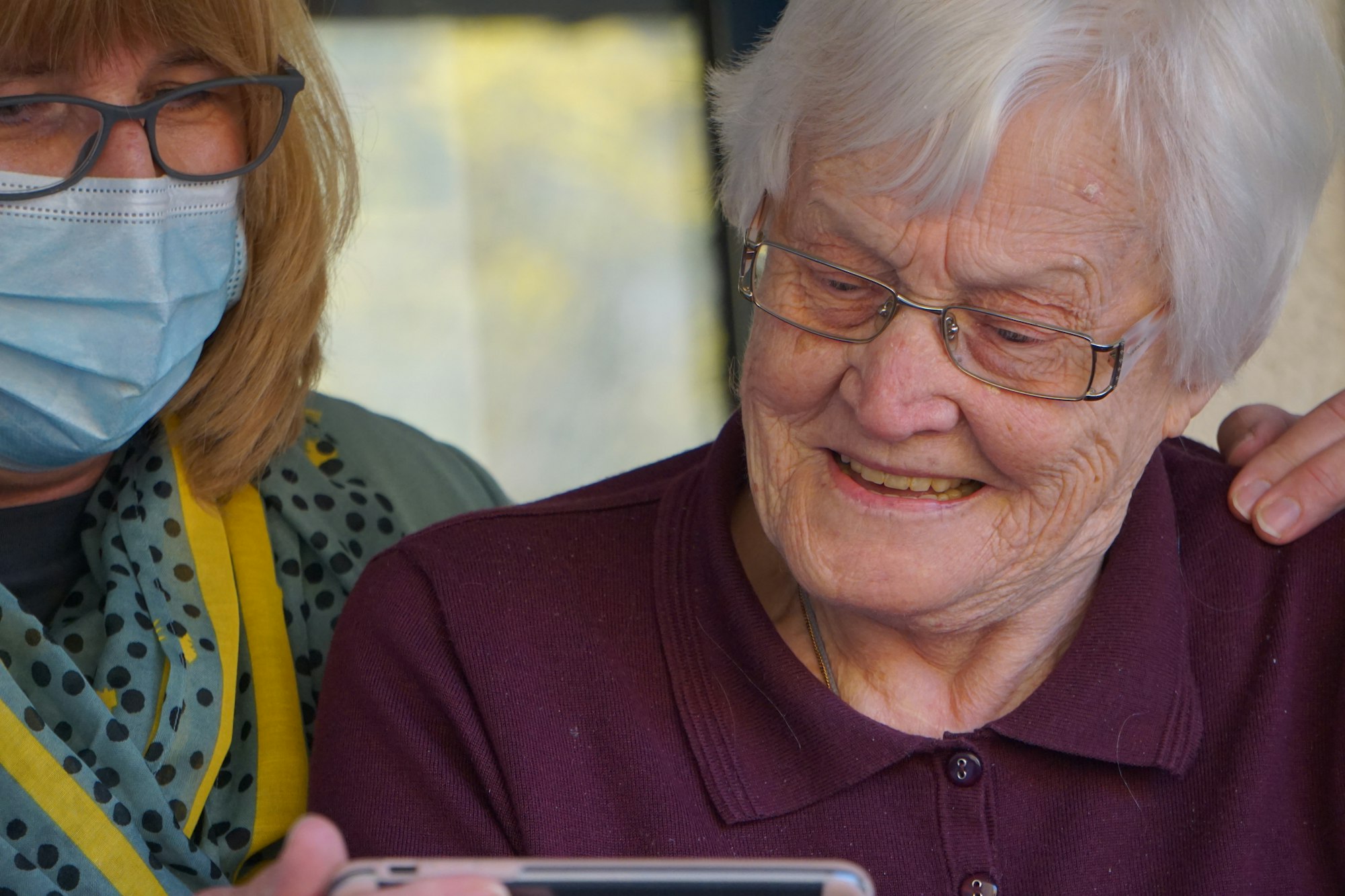
Make celebrations special for your loved one living in a nursing home or assisted living facility. Schedule small family gatherings on different days to reduce the disruption and stress of unfamiliar faces.
Consider participating in the resident holiday activities offered by their home as well to bring familiarity and extra joy!
Practice Self Care

Taking the time to prioritize, delegate, and plan ahead can help you make the most of this holiday season.
Don't be afraid to trust your instincts when it comes to setting boundaries in order for yourself some well deserved personal time!
The holidays can become difficult when caregiving responsibilities are added into the mix. Focus on what is most important to you, as a caregiver. Delegate tasks where possible. Set realistic expectations with others. So they know exactly how much support they may or may not need from you.
Don't forget to take some 'me' time too. Let someone else cover duties every now and again so that both of you get the chance to relax during this festive period!
Trusting your instincts will go along way in helping create a pleasant holiday experience for all Keep in mind that perfect holiday gatherings may not always be possible. There is still plenty of opportunity for fun during get-togethers. The road ahead on your caregiver journey will be challenging. Having realistic expectations will help as Alzheimer's disease advances.





